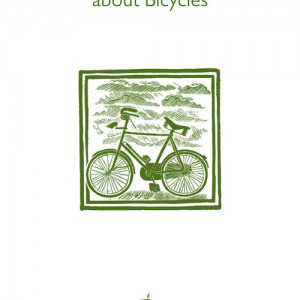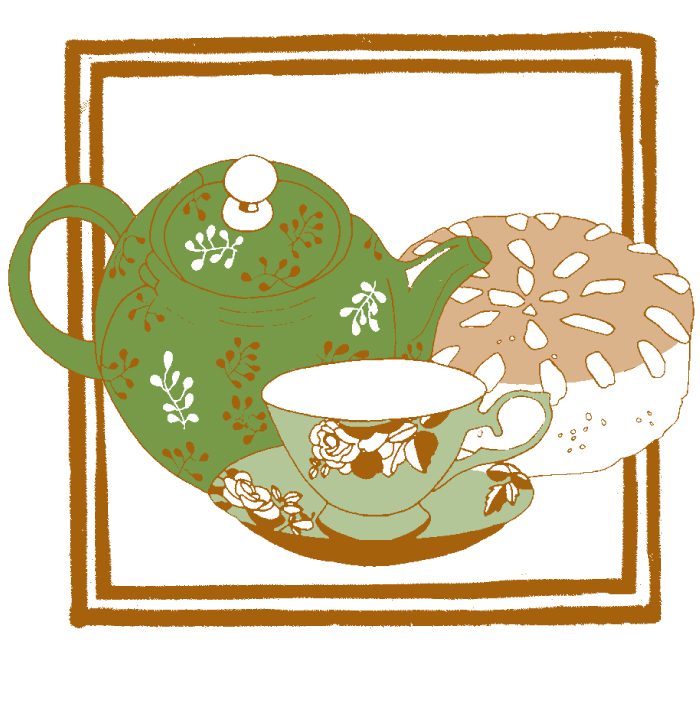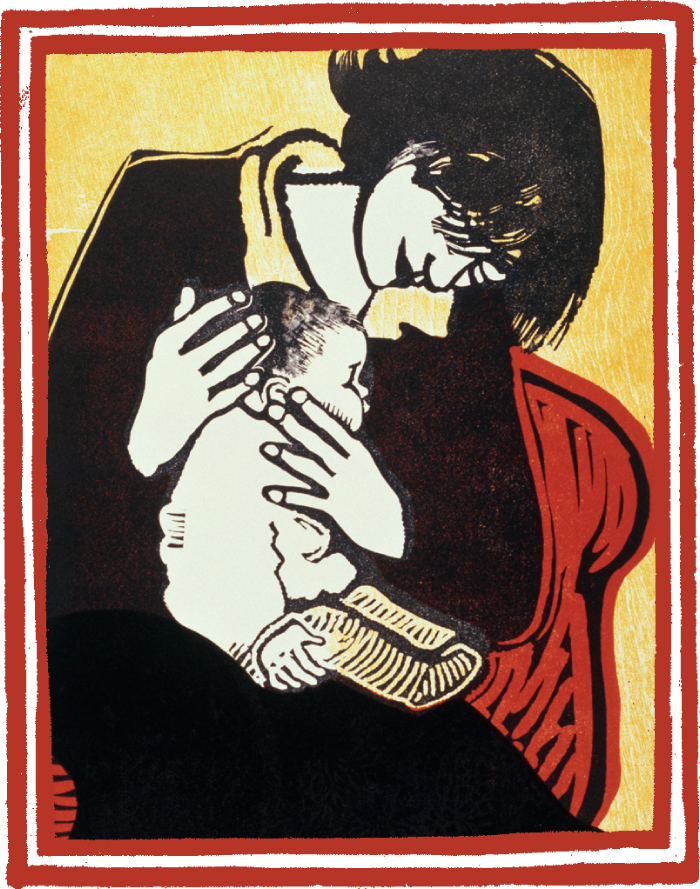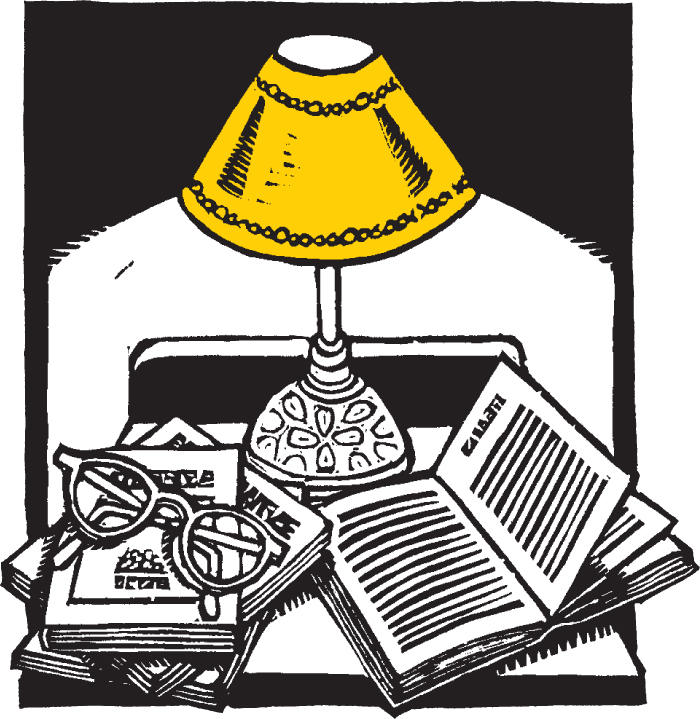In the 2nd of our new series of feature-length interviews with independent publishers, we took afternoon tea with Jenny Swann and Di Slaney of Candlestick Press in our imaginary poetry theatre pub somewhere in Lambeth…
Hello there! What are you drinking?
Jenny: Coffee, from one of those traditional French green-and-gold cups but minus the saucer.
Di: Earl Grey (builder’s strength).
How long has Candlestick Press been running?
Jenny: Since 2008, when I set up as a sole trader, then when Di joined as my business partner in 2010, we became a Limited company.
What were some of the practical things you did to get started?
Jenny: I used some money that my mum left me when she died, to set up the Press. I thought she would consider it a more worthwhile use of her money than putting it towards a banker’s bonus. It was a very small sum (four figures, not five) and it was the first time I had had any money of my own that wasn‘t immediately swallowed up by a mortgage or an overdraft. I won’t go into my utter love of poetry and the pamphlet form here, since your question relates to practical things. So – practical things – I registered a couple of domain names, roped in my husband to build a website to get the Press up and running, linked up with PayPal, registered Candlestick Press as a company (though initially I ran it as a sole trader), asked a friend who studied calligraphy at art college to design me a logo for the Press, and found a really nice local printer to quote me for print runs. Then I sat down to work out what the first four titles should be (four, because less than that seemed not to be making a statement and more seemed too financially risky). Other practical considerations – using really nice paper, what font, house style etc. – involved a fair amount of playing with bits of paper, scissors and glue spread across the floor of my study and pinging all over the screen of my PC. I wanted the Press to belong within a tradition but to have its own contemporary identity too. I also attended a couple of local events run by Nottingham Trent University and an organisation called ‘Cultivate’ aimed at helping people with new companies.
Does your personal background lend itself being an independent publisher?
Jenny: I had been interested in publishing for some time but it was only after working as a poetry editor for a good friend, Ross Bradshaw of Five Leaves Publications, that I learned the nuts and bolts of what’s involved. From the very first poetry pamphlet that I picked, edited and saw through the press for him, I was completely hooked (it was Trailer by Anna Woodford, and went on to win a PBS Pamphlet Choice). I could see that poetry pamphlets posed a challenge, in terms of getting retailers to see the point of them and stock them, but I like a challenge, so that was not a problem. I’m not a natural person to run a business, being rather chaotic and anxious by temperament, so I knew from the start that I needed someone else on board who both loved poetry and knew how to run businesses properly, to help me get on top of the business side of things. Prior to Candlestick Press, I had had three of my own poetry collections published, and had been working in art galleries – lecturing, running poetry workshops and, at the V&A I had been their Licensing Manager, which is where I first realised that bringing art and business together was exciting and worthwhile and where I felt most comfortable.
Di: In a strange way, yes – I’ve been running a marketing business for the past 15 years and this is definitely a useful profession to help Candlestick position itself and develop its potential both as a brand, and as a product range. I’m also a poet and poetry fan, which really helps to match Jenny’s passion and burning enthusiasm for the genre! But probably the most helpful part of my background is having started and grown a small business into a bigger one, and having a good grasp of the commercial drivers and the financial requirements of business growth, irrespective of market sector. I can be a realistic sounding board for business development plans, and make sure that everything is in order in the ‘engine room’ of our business. In advising SME clients over the years on how to plan for success, the one thing they tend to forget is that it’s not just about the sales and marketing push – it’s keeping the less glamorous back end in a glorious state of health so that everything remains possible! Cash flow and credit control can be boring, but unless they’re regularly attended to, the bigger things tend to unravel. We run a nice tight little Candlestick ship, and we’re both immensely proud of our financial independence, and strength.
Where does the name Candlestick come from?
Jenny: Our first four titles were Victorian and Edwardian in mood, so the idea of candlelight seemed appropriate and resonated with the poems. Additionally, I liked the idea of a candlestick as a means to support light shining out into the world – in brief, candlestick seemed a good symbol for the ‘supporting role’ of the publisher, as well as having the right connotations.
Could you describe the sort of poetry you publish?
Jenny: We publish anything that we think is really good, or that our editors think is really good, whether it is historical or contemporary. Most of what we publish has already appeared in other publications, we don’t specialise in new poetry like many publishers, although we do sometime print new poems (there are three coming up, for instance, in this year’s pamphlet of Christmas poems selected by Carol Ann Duffy). Oh, and our pamphlets tend to be themed, so work has to be in keeping with the title and overall feel of the selection.
How are you different from other independent publishers?
Jenny: I think the single biggest difference is that our pamphlets are packaged with envelopes and bookmarks so that people will give them ‘instead of a card’. They are designed to be given, not kept, though quite a few people have told us that they like to buy two copies – one to give and one to keep. It is a very important part of who we are, that we want poetry pamphlets to be a part of the lives of people who wouldn’t necessarily see themselves as poetry readers. We like to think that we are giving some poems the airing and the audience they were hoping for.
On average, how many books do you sell in a year?
Jenny: Last year we sold 47,029 pamphlets – this represented a growth of 15% against the previous year.
Do you sell more online or by wholesale/retail?
Di: The majority of our sales are via wholesale and retail – probably around 70% of our business goes through our distributor Central Books, and also wholesalers Bertrams and Gardners.
What have been some of your biggest successes so far?
Jenny: Every new pamphlet that we publish feels like such a proud moment – when the printer delivers the first copies, I can feel my heartbeat speeding up. Meeting each new pamphlet as a finished item rather than a set of proofs for the first time gives me an adrenaline rush – do the poems look happy and ‘right’ on their pages, does the pamphlet look beautiful? Does it read well? Have we over-looked a typo? Have we done ourselves and the poems and their authors, justice? How to decide what some of our ‘biggest successes’ are – well, that could translate into ‘our best sellers’ or ‘those that have reached the most readers’ (same difference, in my opinion) but I think I can sum up our biggest success, the time when I felt proudest, when I recall one person who emailed us to say that every Christmas she brings out our Christmas pamphlets along with her Christmas decorations, then puts them away until next year. So our little series is becoming part of her Christmas ritual (and starting to smell of cinnamon, apparently). To me, the job of a publisher is to get those poems into the fabric of people’s lives and memories. I think it matters a lot to both Di and to me, to do our job properly.
Di: I agree that doing everything properly is hugely important – both Jenny and I are perfectionists, and the detail of what we do really matters. But to the question of success, for me the biggest success is seeing steady business growth year on year. I obviously get a buzz from new pamphlet launches, and seeing individual titles do well, but far more gratifying is the knowledge that we’re building a great reputation as a brand, a steady and reliable customer base and extending our reach into new markets, which makes continual business growth more sustainable. This year we’re already trading 20% up on last year, and so – with fingers tightly crossed for a good Qtr 4 when we do the lion’s share of our trading – 2014 will hopefully be another solid trading performance for Candlestick.
What’s the best thing you’ve found from the unsolicited pile?
Jenny: Because we don’t tend to publish new work we don’t have an unsolicited pile. We do have a library in which we hang onto work that people have sent us, just in case there’s something that would fit into a future pamphlet.
How important is the physical book design for you?
Jenny: The physical book design is incredibly important to us; we want the pamphlets to look beautiful, to feel gorgeous and to make the prospect of curling up with a few poems irresistible. We are trying to attain beauty in our own little way, to complement the poems inside. We always use top quality paper (despite our printer sometimes trying to convince us we’d get away with something cheaper!) and our house style is the result of a lot of experiment. It’s amazing just how obsessed you can get about fonts, paper, illustrations, and one of the joys of the job is commissioning the right illustrators for each pamphlet and then working with a designer to get all the component parts working comfortably together. We try to use as many young, new illustrators as possible, especially local ones, to give them a leg up in their careers but also more established ones where their work is a natural fit for what we are trying to achieve. For the children’s range, we went back to cover designs from early 1930’s Germany – we like our pamphlets to be both distinct but, as mentioned earlier, to also belong in a tradition. The design studio attached to Di’s marketing business does the typesetting for us, and they are brilliant at translating ideas into reality.
Who prints your books?
Di: We’re fortunate to be able to source print via my marketing business and take advantage of economies of scale offered by bigger print runs through bulk buying. This means we tend to shop around on print depending on how many titles we’re printing or reprinting at a time, but all of our printers are based in the East Midlands and we’re committed to our ‘buy local’ policy for as many elements of the production process as humanly possible.
Could you describe your editing process? And how long does it take start to finish?
Jenny: Most of our editing process is done by email. It probably takes us about 3 months to put a pamphlet together from start to finish, excluding the commissioning of illustrations. If we have invited someone else to select the poems and introduce them, then we are in their hands with regard to receiving the material from them. But once we have everything we need, it’s a case of to-ing and fro-ing with the designer who is type-setting the pamphlet until we are all happy, all the permissions and wordings for acknowledgements have come in from copyright holders, and we can pull everything together. We use the Saison Poetry Library to proof poems against sometimes. Or if it’s a new work, we offer poets the opportunity to proof-read the poem before it goes to press.
What’s your submissions policy?
Jenny: http://www.candlestickpress.co.uk/submissions/
Where do you look for new writers?
Jenny: We read loads of poetry ourselves and go to readings. It’s always so exciting to come across new writers whose work we’d like to use.
What advice would you give to poets today trying to get published?
Jenny: I don’t write poetry any more but I remember very well the roller-coaster of rejections and acceptances. I think the best advice I can offer is ‘be true to yourself’. Keep your own integrity as a person. Editors are human beings; some of them will like your work, some of them won’t. The ones you want to impress won’t like having a large ego shoved in their face, but it’s always worth just politely setting out your stall. It’s reassuring for editors to know that they aren’t alone in their assessment of your work. Some of them will get it right, some of them will get it wrong – they aren’t judges in a court of law, just people with their own tastes and interests.
Di: I’m answering now as an aspiring poet rather than as a publisher. Three top tips: 1. Read as much and as widely as you can. 2. Subscribe to as many poetry journals as you can afford. 3. Never give up on submissions – one of my poems that won a recent competition had been rejected 12 times beforehand by a variety of journals. And I knew the stats on this because I record all my rejections in an Excel spreadsheet …
How do you pay your writers? How does remuneration work?
Jenny: Again, we are rather different to most publishers, in that we are at the mercy of copyright holders, each of whom will make their own demands. Regarding new work, we offer what we can afford consistent with feeling that it is a fair fee.
What is your approach to marketing and promotion?
Di: Gosh, this could be a whole questionnaire in its own right, particularly because you’re asking a marketing person! However, despite my background, Jenny tends to lead on the front end marketing of the business because of her prior contacts in the industry and also her natural talent for this area of work, particularly on press and publicity. We normally have a marketing planning session together for each new title we bring out, way in advance of its completion. We assess whether it will go via our usual routes to market or whether we need to make any new approaches, whether it has a special ‘hook’ or press-worthy angle that we can push, whether a guest editor will be able to help with additional promotional aspects and whether we need to mail or e-shot our existing customer base to announce its launch. Once we’ve tackled the launch publicity and route to market, we usually turn our attention to a social media campaign, and updating our website and news stories. We may additionally decide to run a trade or consumer promotion, linked to store merchandising, but this again would depend on the title, and the time of year – there’s little point running a promotion in the hectic Christmas sale period, for example, as it will be drowned out by other noise. We like to have a presence at trade fairs and exhibitions in as much as our time allows – we can’t attend everything we would want to, but usually manage to do three regional and two national events each year. The networking with other publishers at these things is normally the best bit!
Do you make any money from publishing?
Di: We do make money from publishing. Not a huge amount, but we’ve been in profit for the past five years and have managed to pay ourselves – the only two employees – a small monthly salary and a reasonable dividend each year, depending on overall business performance. We also donate a proportion of our profit on key titles to named charities, and make biannual payments to these charities as the donations continue for the life of the pamphlet. Charitable donations have equated to around 5% of our net profit each year.
What would help? Do you think the state or any other institution should do more for independent publishers?
Jenny: I think the term ‘independent publishers’ covers a huge spectrum – from a one-person set-up in their attic, to companies like Faber & Faber. It’s a personal decision to become a publisher, and a privilege. Publishing good work should not be dependent on ‘market forces’ or private income. Lots of the small magazines and presses that get writers started are run on the back of subsidies and are hugely important and worthwhile. So, I’m glad that there is subsidy available for people doing something really worthwhile – and sorry when it is given to companies or organisations that I don’t think deserve it as much as others who have missed out.
Di: I’m personally of the opinion that every business – irrespective of sector, or product, or service – should be able to stand on its own feet and trade profitably. If it isn’t able to do that without subsidy, then it isn’t an independent business – which doesn’t mean that it shouldn’t trade, or isn’t doing a worthwhile job in its sector, but the definition of what it is should change to reflect its supported status. Sorry if this sounds harsh, but I’ve experienced many swings and dips in my businesses over the years and never once have we had support, we’ve had to fight our own way out of difficult situations and have always emerged the better and stronger for it.
Do you work full-time as a publisher?
Jenny: I don’t work full-time, but I work as close to full-time as other commitments allow me to! Candlestick Press is my main source of income. Luckily, I have no interest in designer clothes or exotic holidays…and, unlike Di (see below) only 2 furry creatures’ vets’ bills to worry about.
Di: No – as already mentioned, I have other business interests which provide my main source of income. Would I be able to survive on Candlestick remuneration alone? Realistically, no – but I do have 107 animals at home to look after!
What do you think is a suitable second occupation?
Di: Anything that provides enough financial support to take the pressure off the start-up phase of a publishing business, and that doesn’t take up too much head space to prevent you from devoting enough thinking time and creative energy to its success.
Has your work suffered from a diversion of energy into other employments or is it enriched by it?
Jenny: Both.
Di: Enriched beyond doubt by different stimuli and influences, although time pressure is and will always be the main issue for me.
Who distributes your books and where can I buy them?
Jenny: Central Books are our distributors. Gardners and Bertrams also hold stock. You can buy them from our website www.candlestickpress.co.uk or from Waterstones, Blackwells, Foyles, lots and lots of independents and some museum and gallery shops.
Do you have any staff? If so, how many?
Di: Jenny and I are the only employees of Candlestick Press, but we subcontract specific pieces of work to ‘experts’ on a regular basis – and we will have two or three subcontractors or freelancers working for us at any one time.
Apart from books/pamphlets, what else do you make?
Di: Tea! And each other very amused …
What other indie publishers do you like?
Jenny: Too many to name, really. Both Di and I look for certain attributes – good authors, good design, nice people running the show, passion for the sector, good ethics etc. – but we both have different tastes, of course.
How optimistic are you about the future of independent publishing? Are you satisfied with your own solutions to the problems it currently faces?
Di: I think there’s every reason to be optimistic about the future – we’re seeing some fantastic business start-ups around us, with great passion and energy for their brands, and some lovely new work out there in the market as a result. As Candlestick, we’ve nothing but innovation planned for our future (new titles, new markets, new customers) and these plans are built on very firm foundations. I can’t honestly see external forces derailing us – the only thing that might affect the future of Candlestick is if either Jenny or I decide to focus on other things, but that isn’t going to happen in the short to medium term.
Do you have anything to add about e-books / Amazon / the Internet that hasn’t already been said a thousand times before?
Di: No. More tea please!
What advice would you give to someone starting their own independent publishing business today?
Jenny: It’s the best job in the world. But go carefully – as the joke goes, “the best way to make a small fortune in publishing is to start with a large one.” If you’re inexperienced at running businesses, find someone else who can help.
Tell me something about being an independent publisher that most people don’t know.
Jenny: It’s an ideal job for Mother Hens – it’s about loving something and wanting to tell the whole world about it, and making sure that your baby goes out into the world properly togged up against all weathers.
Di: It doesn’t have to be all about the books. Think about your customers first, and your business finance second. The books are the easy things to sort out afterwards!
Pub Chat aims to highlight the extraordinary amount of interesting poetry presses there are today, and the amazing work they do and the incredible writers they publish. We hope this survey will give poets and writers alike a greater knowledge of the independent publishing landscape as a whole, as well as providing a public forum where publishers can be honest, open and candid about publishing as a business. A few questions from this interview have been appropriated from Cyril Connolly’s 1946 ‘The Cost of Letters’ survey.





Add your Reply
You must be logged in to post a comment.